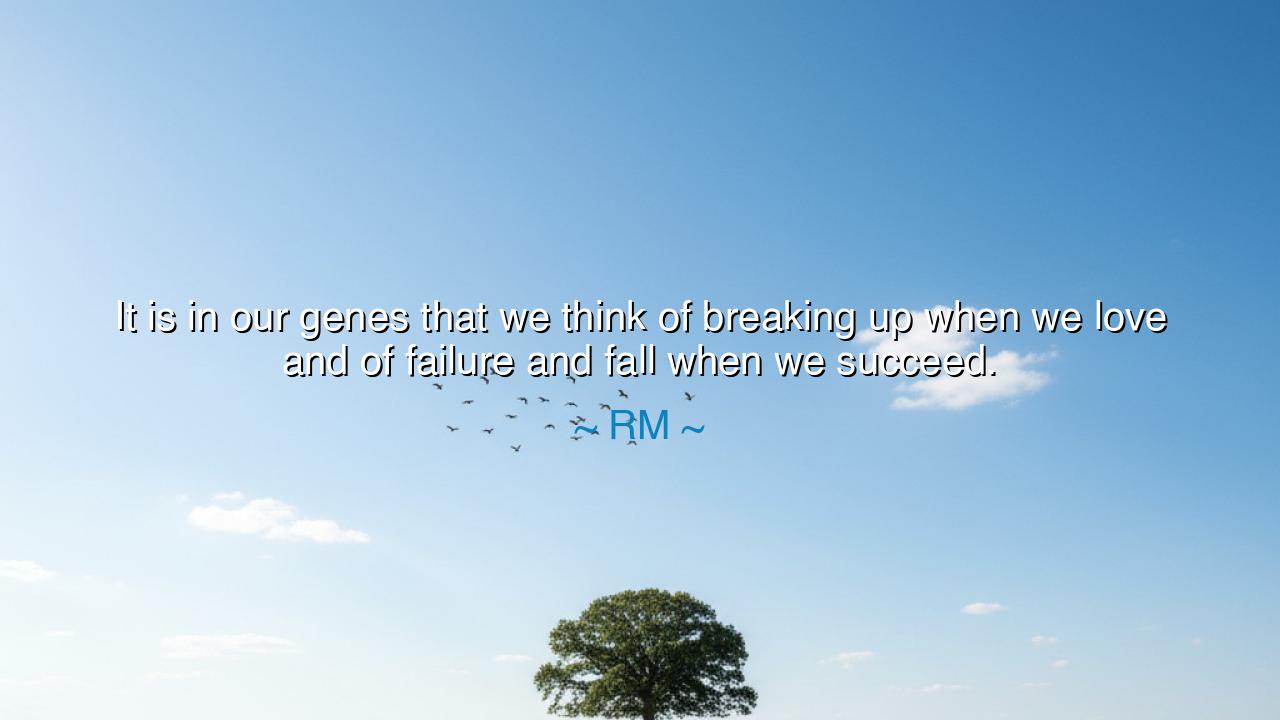
It is in our genes that we think of breaking up when we love and
It is in our genes that we think of breaking up when we love and of failure and fall when we succeed.






Host: The room feels calm, the soft glow of the lamp casting a warm light across the space. Outside, the world has quieted down, and the atmosphere feels right for a conversation about love, success, and the paradoxes in human nature. Jeeny sits on the couch, her legs tucked beneath her, a cup of tea resting in her hands. Jack, standing by the window, gazes out at the darkened world outside, clearly reflecting on something.
Jeeny: “Jack, I came across a quote from RM today that really made me think about the complexities of love and success,” she says softly. “He said, ‘It is in our genes that we think of breaking up when we love and of failure and fall when we succeed.’ What do you think about that?”
Jack: He turns slowly, a thoughtful expression crossing his face. “That’s such an interesting and somewhat paradoxical statement. RM is touching on the way our minds work, how we often associate love with the fear of loss, and success with the possibility of failure. It’s like we’ve been conditioned to think that the closer we get to something — whether it’s love or success — the more vulnerable we become. There’s a constant underlying fear that things won’t last. Even when we’re achieving or feeling deeply connected to someone, we fear that it might slip away or collapse.”
Jeeny: “Exactly. It’s almost as if RM is pointing to this deep internal conflict we all have. When we love, we sometimes fear the end of it, and when we succeed, we anticipate the inevitable fall. There’s a kind of paradoxical mindset that when something is too good or too perfect, it’s bound to crumble. We often sabotage ourselves with this fear of losing what we have, whether it’s love or success.”
Host: The light in the room seems to soften as the conversation deepens. Jeeny speaks with an understanding that humans often struggle with the fleeting nature of happiness, love, and success. Jack stands still, reflecting on how these fears, rooted deep in our psyche, shape how we experience both joy and accomplishment.
Jack: “I think it speaks to the fragility we feel as humans. Love and success are both powerful experiences, but they’re also unpredictable. We can be deeply afraid of losing either of them, and so, we hold them at arm’s length in some ways. It’s like we anticipate failure even when things are going well, and it makes it harder to fully embrace or enjoy what we have in the present moment. Instead of savoring success or love, we’re already thinking about how it could all fall apart.”
Jeeny: “Yes! It’s like we fear the vulnerability that comes with loving or succeeding because, deep down, we know that impermanence is part of life. But that fear can hold us back from truly experiencing what we have, or it can prevent us from fully celebrating our success. We’re constantly worried about what might go wrong instead of being present in the moment. It’s almost like we’re programmed to protect ourselves from disappointment by expecting it to come.”
Host: The conversation takes on a more introspective tone as they reflect on how human nature is often shaped by fear and the anticipation of loss. Jeeny and Jack both agree that it’s difficult to truly enjoy love or success without this constant underlying fear of losing it. RM’s words remind them that the paradox of human nature is that the more we love or succeed, the more we’re likely to fear that very thing slipping away.
Jack: “It’s almost like we’ve been trained to expect the worst, even when things are going right. There’s a fear of being too happy, too successful, because we think that’s when the fall is most imminent. It’s as if we feel we don’t deserve to have something so good for too long. This mindset keeps us in a constant cycle of anxiety.”
Jeeny: “Exactly. And the worst part is that this fear often prevents us from fully appreciating the good things in our lives, whether it’s love or achievement. We hold back from fully embracing what we have because we’re too worried about losing it. RM is reminding us that part of being human is dealing with that duality — the fear of loss and the awareness that nothing lasts forever. But that doesn’t mean we shouldn’t experience love or success to the fullest when they come.”
Host: The room feels quieter now, as if the weight of their conversation has settled into something deeper. Jeeny and Jack reflect on the tension between love and fear, success and failure, and how these fears shape their experiences. RM’s words remind them that while fear of loss is natural, it shouldn’t prevent them from fully living in the moment and embracing the beauty of what they have. Both love and success are fragile, yes, but they are also powerful, and learning to accept the impermanence of these experiences allows us to enjoy them without the constant worry of what might come next.






AAdministratorAdministrator
Welcome, honored guests. Please leave a comment, we will respond soon